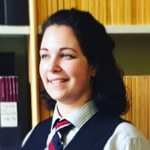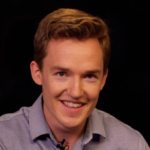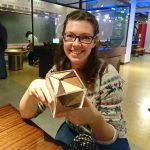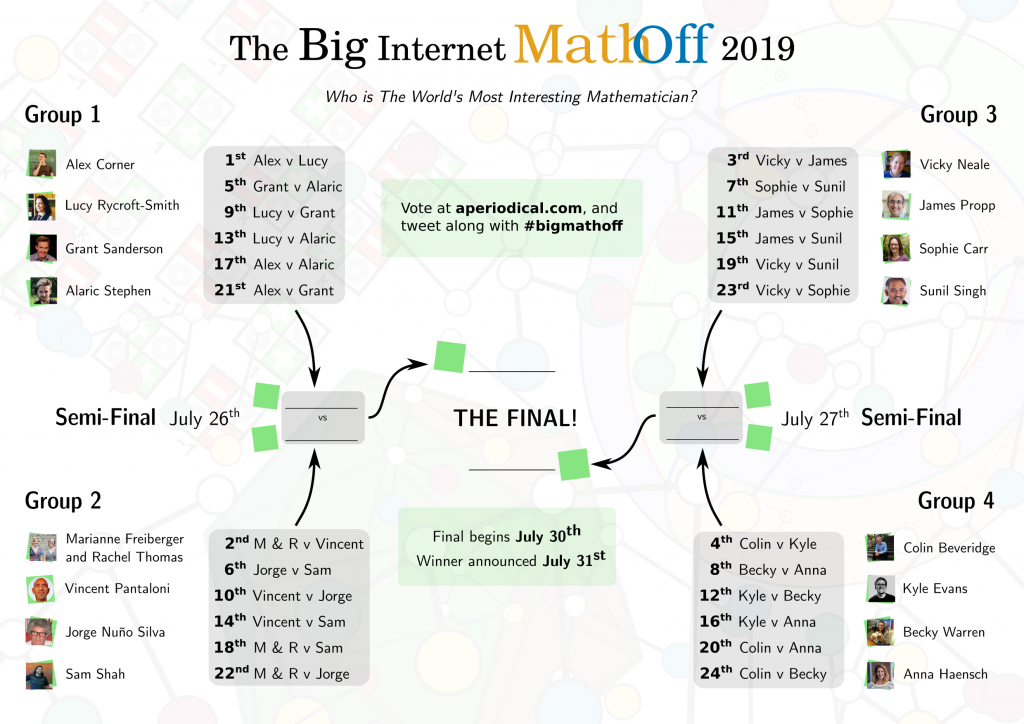Because we all had so much fun last year, we’re running a second edition of the internet’s hottest maths competition:

Continuing our mission to provide alternative summer knock-out tournaments that don’t involve grassy fields, we’ve invited 16 more fun maths people to tell us about some fun maths things.
Last year we lost half the competitors after only hearing one bit of fun maths from them, which was a gross under-use of their expertise. This year’s Big Internet Math-Off will begin with a group-of-four stage, followed by semi-finals and a final. Everyone will make at least three pitches, but the most victorious will go through and keep pitching until the bitter end.
Each match will pit two interesting maths things against each other. The mathematician who gives the most interesting things in each group, as decided by you, goes on to share another fun maths thing in the next round. In order to make the whole thing hang together, we’re going to call the person who wins The World’s Most Interesting Mathematician (2019)*.
* of the 16 people I contacted, who were available in July, and wanted to take part.
I’ve asked the competitors to come up with maths topics they find interesting. I don’t need new things, or things that they came up with – just the kind of thing that you’d tell a fun maths friend about when you bump into them.
The tournament will start on the 1st of July. Each match will be a post here on The Aperiodical, where the two competitors will each make a pitch for something they find interesting. At the end there’ll be a poll where you can vote for the thing you found most interesting. Each poll will be open for 24 hours, and then the person with the most votes will be victorious in that match. After the initial group stages, the four winners will take part in two semi-finals, followed by a final to decide the winner on the 30th of July.
Without further ado, here are the charming people who will be trying to out-maths each other to victory this year:
Alex Corner

Alex Corner is a lecturer at Sheffield Hallam University interested in category theory and maths education. You can find him as Fabstract Nonsense on Twitter at @alexcorner.
Lucy Rycroft-Smith

Lucy Rycroft-Smith is a researcher and writer at Cambridge Maths (an organisation creating an innovative map of school mathematics 3-19). She was a maths teacher for ten years across primary, secondary and HE and is the co-editor of Flip the System UK: A Teachers’ Manifesto. She’s @honeypisquared on Twitter.
Grant Sanderson

Grant Sanderson makes videos on the YouTube channel 3blue1brown centered on visualizing math. Once upon a time, he also used to make content for Khan Academy. He’s @3blue1brown on Twitter.
Alaric Stephen

Alaric Stephen is one of the two hosts of the recreational maths podcast Odds and Evenings. He’s currently teaching Maths and Engineering at Hereford Sixth Form College.
Marianne Freiberger and Rachel Thomas

Marianne and Rachel are co-editors of Plus magazine, a free online magazine about maths aimed at a general audience. They have also written three popular maths books and edited one.
Vincent Pantaloni

Vincent Pantaloni is a French maths inspector who co-authored with Ed Southall the books Geometry Snacks and More Geometry Snacks. He shares some mathsy GIF animations made with GeoGebra on Twitter as @panlepan.
Jorge Nuno Silva

Jorge Nuno Silva is a Portuguese mathematician (PhD UCBerkeley 1994), President of Ludus and Professor at the University of Lisbon (Department of History and Philosophy of Science). He is an editor of Recreational Mathematics Magazine and Board Game Studies Journal.
Sameer Shah

Sameer Shah has been teaching high school math in Brooklyn for the past twelve years. You can read his musings about his classroom at Continuous Everywhere but Differentiable Nowhere. He’s @samjshah2 on Twitter.
Vicky Neale

Vicky Neale is the Whitehead Lecturer at the Mathematical Institute and Balliol College, University of Oxford, which means her job is to be enthusiastic about mathematics with undergraduates, school students, and anyone else she can find. She is the author of Closing the Gap: the quest to understand prime numbers. She’s @VickyMaths1729 on Twitter.
Jim Propp

Jim Propp is a math researcher/teacher/popularizer on the faculty of the University of Massachusetts Lowell who blogs at Mathematical Enchantments. Jim is active in the Gathering 4 Gardner Foundation, the Global Math Project, and the National Museum of Mathematics. He’s @JimPropp on Twitter.
Sophie Carr

Sophie Carr is the founder of Bays Consulting. Having grown up building Lego spaceships she studied aeronautical engineering before discovering Bayesian Belief Networks which has led to a career she loves – essentially make a living out of finding patterns. She prefers fresh coffee over tea, pears over apples and her favourite flower is the tulip. She’s @SophieBays on Twitter.
Sunil Singh

Sunil is an author and speaker on the complexity, creativity, and curiosity of mathematical play! He works as a Mathematics Learning Specialist for Buzzmath. He’s @mathgarden on Twitter.
Colin Beveridge

Colin Beveridge is the author of two popular maths books and several unpopular ones, all of which are available wherever good books are sold. He writes the Flying Colours Maths blog, brings up two children with his partner, and has his eyes on a triathlon in the distant future. He has an equation named after him and once set himself on fire making a sandwich. He’s @icecolbeveridge on Twitter.
Kyle D Evans

Kyle D Evans is an award-winning maths communicator, musical comedian, teacher and general jack of all mathematical trades. He’s @kyledevans on Twitter.
Becky Warren

Becky Warren is a freelance maths educator and communicator. She loves neat mathematical puzzles, mathematical art and origami. Her occasionally updated blog is called Lines Curves Spirals. She’s @becky_k_warren on Twitter, where she loves joining in the #beingmathematical chat on Thursdays.
Anna Haensch

Anna Haensch is a professor at Duquesne University in Pittsburgh, PA. She’s a number theorist, math blogger, and sometimes podcaster. She’s @extremefriday on Twitter.
You’ve got \(2 \times \left( {}^4C_2 \times 4 + 2 + 1 \right) = 54\) bits of fun maths to look forward to over the next month. I’m sure there’ll be some old favourites, and plenty of stuff you’ve never heard of – looking at the list of things that are going to come up, there were a fair few things I’d never seen before.
Of course, no Summer knock-out tournament would be complete without a wall-chart to print out and follow along at home, so I’ve made one:

The tournament begins on the 1st of July, with Alex Corner facing Lucy Rycroft-Smith. Until then, tweet, toot and post your ideas for interesting bits of maths with the hashtag #bigmathoff.
Great to see 16 new people (i.e., no repeats from the last year). Does this mean we will have a great math-off after 16 years (where winners from the 16 years fight for the tile), and a great-great math-off after 272 years?
I’m a repeat; sorry! If it makes you feel better, I got eliminated in the very first round of BIMO 2018, so I’m as close to being “new” as one can possibly be without actually being new.
get ready for a knockout
_*&%>]
This’ll be FUN! Who is keeping the Mutuel book?
The rules are not stated clearly. Who advances from the group stage? It is clear if one wins three matches, but what in the case 2:2:1:1 or 2:2:2:0?
Unless there’s an edge case I haven’t thought of, it’ll be the competitor with the highest total of votes across their three matches. If there’s still a tie, I’ll have to use the Extremely Fair Tiebreaker
What if there is 3:1:1:1 but the person who won all 3 matches got less votes than anyone else?